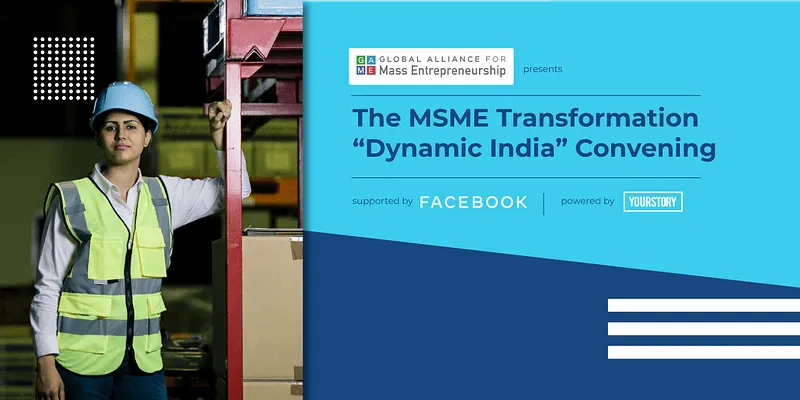
GLOBAL ALLIANCE FOR MASS ENTREPRENEURSHIP
View Brand PublisherCapital infusion in last mile lenders, rationalising compliances & embracing digitisation: Strategies to revitalise MSME sector
The MSME Transformation “Dynamic India” Convening, hosted by the Global Alliance for Mass Entrepreneurship (GAME), supported by Facebook and powered by YourStory, on July 15, saw influential leaders and prominent stakeholders giving their insights on transforming the crucial sector.
Exploring blended funding mechanisms to boost credit disbursal and liquidity, rationalising and streamlining compliance processes to improve ease of doing business, investing in quality equipment to enhance global competitiveness and encouraging entrepreneurship with enlightened self-interest were some of the measures discussed at length at the MSME Transformation “Dynamic India” Convening on July 15 to help Micro, Small and Medium Enterprises (MSMEs) survive, revive, thrive their growth momentum.

Over a series of panels, the convening, hosted by the Global Alliance for Mass Entrepreneurship (GAME), supported by Facebook and powered by YourStory, saw some of the most influential leaders and prominent stakeholders from the ecosystem giving their perspectives on transforming the crucial sector, which has been in dire straits due to the COVID-19 pandemic.
Charting the roadmap to MSME transformation
Madan Padaki, co-founder, GAME, began the proceedings by stressing the need for multi-stakeholder collaboration to help MSMEs get past low levels of productivity and competitiveness that were seen even before the pandemic.
To that end, he added that an ‘MSME Transformation Task Force,’ of diverse stakeholders was constituted to chalk out solutions and suggest reforms.
Dr. K. P. Krishnan, Former Secretary, Ministry of Skill Development and Entrepreneurship, Government of India listed out various recommendations from a report released by the task force titled ‘Improving Economic Dynamism and Accelerating MSME Growth’. These included short-term measures like mandating 30 percent of the stimulus package for those falling under the micro and small categories; medium-term reforms such as streamlining of processes to improve ease of doing business, and long-term reforms to create an entrepreneurial movement where MSMEs can effectively cater to local demand while being globally competitive.
Mr. Amitabh Kant, CEO, NITI Aayog, commended the authors of the report, and said that they will work in partnership with the MSME Ministry to take it to the stage of implementation.
“MSMEs are critical to the Indian economy...they are at the centre of the Prime Minister’s call for an Atma Nirbhar Bharat,” he said, adding that making India an integral part of the global supply chain and bringing advancement and technology to the MSME sector was a key step in that direction.
Mr. Kant also noted the vast number of acts and rules at the state level that hinder the ease of doing business, adding that the government is committed to work with the states on the matter, and 1,400 laws have been removed towards this end.
The NITI Aayog CEO also said that the packages to aid MSMEs during the pandemic are being implemented swiftly.
“Banks have sanctioned amounts worth Rs 1.21 lakh crore, and Rs 65,000 crore has been disbursed under Emergency Credit Line Guarantee Scheme (ECLGS) of Rs 3 lakh crore,” he said.
The new definition for MSMEs aims to increase their competitiveness, he added.
Addressing the credit gap
Credit is essential for the survival of any enterprise, and while the government’s efforts such to bring liquidity to banks acknowledges the crucial role of other stakeholders to revive MSMEs, there is a need to address the large credit gap, said Ms. Anjuly Chib Duggal, Former Secretary, Department of Financial Services, Government of India, who chaired the first panel that discussed strategies for reviving the disrupted flow of credit to MSMEs.
The panel also consisted of Nandita Ganpathy, CFO, Northern Arc Capital; Dr. D Vijay Kumar, Commissioner and Secretary, Planning and Finance, Government of Meghalaya; Hardika Shah, Founder and CEO, Kinara Capital; Geeta Goel, India Director, MSDF; and RK Vijay Byrsaat, Founder, COLKS.
Vijay from COLKS said lack of collateral, poor dissemination of information on implementation of policies and inability to understand new business concepts by lenders were hurdles for entrepreneurs, especially first-timers, to approach banks.
Dr. Vijay from the Meghalaya government suggested the creation of an intermediary between the bank and a large ‘yet-to-bank’ informal sector entrepreneurs to get access to credit to help explain business plans, among other requirements that could help access this unserved sector.
Hardika from Kinara Capital said lack of clarity on collections, and whether the moratorium being applicable to NBFCs were major NBFCs. She added that there was a need for simpler regulations on foreign capital to invest in NBFCs and the need to push banks to provide capital to them.
Nandita from Northern Arc Capital said that innovative financial solutions and structured finance are crucial in the MSME recovery process through products like credit guarantee schemes, partial credit guarantee back loan, pooled bond issuances, among others.
Micro enterprises are the bottom of the bottom of the pyramid, said Geeta from Michael & Susan Dell Foundation, and there should be a focus on particularly meeting credit demand from micro enterprises, which are mainly informal.
She added improving access to information through digitisation will improve their access to credit, and providing platforms that will help reduce the burden of designing processes, customer acquisition, and compliance for MSMEs could benefit them in the short-to-medium term.
Facilitating growth by improving ease of doing business
“Whether stakeholders view compliance as a ‘thorn in the flesh, or ‘dagger in the heart,’ it goes without saying that improving ease of doing business will benefit MSMEs immensely,” said Manish Sabharwal, Chairman, TeamLease Services who chaired the third panel that spoke about the strategies around improving the ease of doing business to improve the productivity of MSMEs.
The panel also consisted of Vikram Sood, Co-founder, Hungry Wheels; Bhuvana Anand, Director, Research, at Centre for Civil Society; Mr. Devendra Kumar Singh, Development Commissioner MSME and Additional Secretary, Ministry of MSME, Government of India, and Arvind Sharma, Partner at Shardul Amarchand Mangaldas,
Vikram from Hungry Wheels advocated for a “one nation, one license” approach to improve ease of doing business as it was difficult for a business to be compliant across 30 states and various local bodies at multiple times to conduct business given the drain on time and resources.
Bhuvana from the Centre for Civil Society noted that often, there is a difference between the law and its actual implementation that reduces the ease of doing business. She advocated for a more decentralised approach that increases competitiveness among states to improve the ease of doing business.
Arvind Sharma from Shardul Amarchand Mangaldas said there was a need for more sophisticated drafting practices, simplified legislation, and removal of certain legislation has been taking place to prevent excess government interference in conducting business.
Mr Devendra from the Ministry of MSME said that the government has been taking steps to improve the ease of doing business such as starting a new Udyam registration portal that is free of cost and paperless, and the CHAMPIONS portal for grievance redressal. He added that simplification of procedural issues and implementation are the key to improving ease of doing business.
Strategies on capturing the global export opportunity
Aim high by accessing trade fairs and export opportunities online, build competitiveness, seek help from trade bodies and create advocacy by giving encouragement to MSMEs, said, Ramesh Mangaleswaran, Senior Partner, McKinsey & Company, who chaired the third panel that focused on the challenges and enterprise enhancement mechanisms that would make India a global exporter.
The panel consisted of Srinivasan Srini, CFO and Executive Director Bosch India; Mrs. Gunjan Krishna, Commissioner, Directorate of MSME, Government of Karnataka; Ashok Saigal, Co Chairman, CII National MSME Council; Mr. Chandranath Som, Deputy Director General at Federation of Indian Export Organisations (FIEO) and Monalisha Borthakur, Founder, AmbyGold Manorama Foods.
Srinivasan from Bosch India said that MSMEs need to change their mindset from “jugaad culture” by investing in technology, world-class machinery and skill development for MSMEs to become globally competitive. They also need to focus on creating value-addition to their offerings and strengthen advocacy by spreading success stories among the youth to take up entrepreneurship.
Ashok from CII said that the trade body has worked towards increasing the global outreach through various events, one of them being the global MSME Summit. He added that the government has been responsive to the needs of MSMEs in these times, and that with this support, MSMEs can work towards being cost competitive according to global standards.
Mrs. Gunjan from the Karnataka government said the state has provided industrial clusters and food parks for MSMEs to operate cost-competitively, and increasing the time limit to secure key permissions. She added that MSMEs also face big challenges to scaling up as they do not have access to markets, skilling, finance, and professional services among others, and that the Karnataka government has been working towards creating a platform for MSMEs to provide access to these services to ensure a level playing field.
Monalisha from AmbyGold Manorama Foods said that in her experience of producing rice, MSMEs also need a backward linkage in government schemes to improve access to logistics hubs like airports and also forward linkages to provide producers access to markets.
Mr Chandranath said that access to information is crucial to access the export markets. To that end, the Directorate General of Foreign Trade has released a new platform that provides updates and clarification on policy, and services such as issuing of Importer Exporter Code (IEC), advance authorisation among others. He added that another platform developed by FIEO an Indian Trade Portal to make regulatory information, and that on foreign business opportunities, among others, on a single platform.
Creating an encouraging entrepreneurial Ecosystem
Mekin Maheshwari, Co-Founder, GAME and Founder of Udhyam Learning Foundation, chaired the final panel on what constitutes the entrepreneurial mindset, and the ways to foster a culture that encourages entrepreneurship.
To the panelists, which consisted of Daniel Isenberg, CEO, Entrepreneurship Policy Advisors; Raj Gilda, Co-Founder, Lend-A-Hand India ; Julia Karst, Head of Projects, GIZ India and Anand Deshpande, Founder, deAsra Foundation, Mekin asked a simple question: “Is entrepreneurship difficult?” that kicked off a vigorous discussion
Raj from Lend-A-Hand India said that entrepreneurship is not an easy venture, nor should it be glamorized as a fashionable thing to take up. He added that at its heart, entrepreneurs must learn how to figure things out by themselves, and bringing entrepreneurship as a part of the school curriculum can give a greater exposure to the younger generation, and help foster the culture.
Dan from Entrepreneurship Policy Advisors stated that entrepreneurs are those business owners that grow, and common traits include the ability to work extremely hard with energy and persistence. He added that an ecosystem with a high tolerance for mistakes, and a society that can re-absorb failures through strong bankruptcy laws, re-training, among others makes it conducive for more people to take up entrepreneurship. On an individual level, people supporting local entrepreneurs out of enlightened self-interest will go a long way in developing a culture of entrepreneurship.
Julia from GIZ India said that women face additional challenges as entrepreneurs due to gender inequality. She also highlighted that the gaps in connectivity, whether it be access to information, financing, among others in the ecosystem, hinder the ability of entrepreneurs to grow their ventures and added that being exposed to role models who are on the path entrepreneurship opens people up to possibilities, and thus, encourages more persons to take up the calling.
Anand from deAsra said that it is important to have a network of like-minded entrepreneurs that could provide the support system needed to make the journey easier. He added that too many regulatory processes and procedures set up entrepreneurs to fail and that supporting the local entrepreneur can help foster an entrepreneurial culture within the community.







